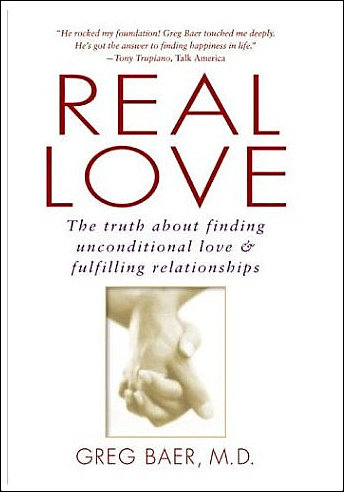Let’s talk!
“…You’re on your way to a town two hours away.… You’re going because everyone there is genuinely happy. They’re happy because they feel loved. In this place, there is no fear or anger. You sense with absolute certainty that the only concern of everyone in that town is your happiness.… You can see that it doesn’t matter to them whether you’re smart or pretty or handsome.… They truly don’t care if you say something stupid or if you make mistakes.…it’s impossible to be embarrassed or ashamed around these people because they love you no matter what you do”.
The above excerpt is from the book Real Love by Greg Baer M.D. This passage challenges our idea of how truly loving individuals behave. Most people can’t imagine such an ideal place because very few of us have given or received real love.
I read Real Love many years ago, and as I recently sifted through the pages, I was again struck by the wisdom and truth of Baer’s ideas. Here are some of the highlights.
 Greg Baer is a successful surgeon, teacher, author, and businessman. Although his credentials are impressive, his emotional and spiritual journeys are similar to many of us.
Greg Baer is a successful surgeon, teacher, author, and businessman. Although his credentials are impressive, his emotional and spiritual journeys are similar to many of us.
When Baer was a child, he was told by his parents and community that if he worked hard, did the right things, he would grow up to be a happy person. Baer was very driven and worked very hard to achieve that promised sense of well-being. He was valedictorian of his high school class; he finished college in two and a half years; and received the highest honors in medical school. He specialized in eye surgery and soon owned one of the most successful ophthalmology practices in the United States.
Baer became financially very successful, and all his material needs were satisfied. He performed thousands of operations and taught other physicians in his community and across the United States. He was a leader at his church and in the Boy Scouts group. He then got married and became the father of five beautiful children.
By his late thirties, the author had unquestionably achieved worldly success, yet the happiness promised was eluding him. He was very troubled and started to suffer from insomnia. He took sleeping pills to help himself sleep, but after a while the pills were ineffective. He then took tranquilizers, and soon he was injecting narcotics every night. He became a drug addict, and almost attempted suicide with a loaded gun. Near the end of that period, his twenty-two-year marriage ended because of his erratic behaviour.
He went into an in-patient drug treatment facility and after his discharge, participated in a twelve-step program. The drug problem was resolved, but the emotional and spiritual emptiness remained. He tried many types of healing strategies: individual/group therapy, support groups, men’s groups, New Age techniques, Native American spiritual groups…etc. Although these groups offered words of wisdom, Baer still didn’t feel any better.
Baer became acquainted with members of some of these self-help groups, and together they tried to find strategies or ideas that really worked. Ultimately, they discovered that the missing element in their and most people’s life was unconditional love.
According to Baer, real love is “caring about the happiness of another person without any thought for what we might get for ourselves”. When we are unconditionally loving towards another person, we are not disappointed, hurt, or angry if the person is inconsiderate, thoughtless, or does not give us anything in return.
The effect of unconditional love is a “profound and lasting sense of peace and fulfillment that deeply satisfies and enlarges the soul”. Being unconditionally loving does not imply that we become a doormat or accept any behaviour from a person. It means that if we need to correct someone, we do it with care and concern and not with anger and disappointment.
People’s entire reason for living is to finally experience the state of peace that is created by unconditional love. When we experience real love nothing else matters, and without real love, nothing else is enough. Also, real love creates a bond between us and another person, and we at last feel included in the Human Family.
To be unconditionally loving is a process since most of us have been exposed to conditional acceptance all of our lives. Conditional love is “I like how you make me feel”. Consequently, the majority of us enter into romantic relationships feeling empty and expecting our partner to fill the void of a lifetime of lack of unconditional love. The result is often an unhappy relationship because it is not our partner’s role to fulfill our every need.
There are four categories of imitation love: praise, power, pleasure, and safety.
Praise is when others tell us how wonderful we are. This usually includes flattery, gratitude, approval, respect, etc. Power is when we control others through money, authority, sex, persuasion…etc. Pleasure is a way to numb the emptiness of lack of unconditional love through sex, movies, travel, shopping, food, etc. in order to make life more bearable. Finally, safety is the avoidance of any additional pain by not taking any risks such as staying in a dead-end job, an unfulfilling romantic relationship, or not trying anything new.
The problem with imitation love is that its effects wear off quickly and over time, we need a greater amount to get the same effect. Also, when we lack unconditional love in our lives, we tend to display Getting and Protecting Behaviours.
 Getting Behaviours include lying, attacking, acting like a victim, and running. Protecting behaviours are lying, attacking, acting like a victim, and clinging.
Getting Behaviours include lying, attacking, acting like a victim, and running. Protecting behaviours are lying, attacking, acting like a victim, and clinging.
Lying is when we don’t tell the whole truth about a situation, whether by deleting some facts or modifying them so that people can like us. Attacking is using fear to get people to do what we want. Attacking can encompass making others feel guilty, criticizing them, withdrawing approval, among others. Acting like a victim includes a variation of these three sentences: “1. Look what you did to me; 2. Look what you should have done for me (and didn’t); and 3. It’s not my fault”.
Running is moving away from the source of pain by avoiding to confront issues, ending relationships, or using drugs/alcohol to escape. Finally, clinging is to tightly hold on to people who give us imitation love. For example, we may use flattery, going out of our way for people so they feel obligated to us, or telling them how we can’t survive without their love.
We often use Getting and Protecting Behaviours because we get immediate results from them and for a brief moment, we feel better. Unfortunately, we pay a great price for these behaviours because the person at the receiving end senses our selfish intentions, and automatically withdraws from us. Consequently, we are left with a greater emptiness than before using these Getting and Protecting Behaviours.
There are four steps to experience real love. The first step is to tell the whole truth about ourselves to a wise person. Wise people are individuals who feel sufficiently loved themselves that they are capable of loving us even with all our flaws. Secondly, we will, therefore, be seen for who we really are; thirdly we will feel accepted, and finally, we will feel unconditionally loved.
Baer underlines the fact that it may take a while to find wise individuals, and that we may get only small doses of real love every once in a while. However, if we persevere, these four steps will become a habit and the sense of well-being from unconditional love will make imitation love very unappealing. Also, Getting and Protecting behaviours will naturally stop as we experience consistent real love.
Although most of us had well-intentioned parents and communities, we were not taught how to give and receive the most important thing in life: real love. Dr. Greg Baer had to be on the brink of suicide before he could identify this essential element to a successful life.
In the absence of real love, people settle for imitation love in the form of praise, power, pleasure, and safety. Also, people who feel unloved display Getting and Protecting Behaviours that guarantee that they will never receive the real love they crave.
Baer proposes simple steps that can help us experience true love in our lives: telling the whole truth to a wise person, being seen and accepted, and feeling unconditionally loved. Becoming an unconditionally loving person is a life-long process, but the effort is worth the ultimate goal of feeling a deep sense of peace and a real connection to others.
Interested in buying the book Real Love? Click here.
Literary Truths
Here are interesting quotes from the book Real Love:
- “Don’t blame your partner for your unhappiness, which is really caused by a long-standing lack of Real Love in your life.”
- “For most of us, the real meaning of “I’ve fallen in love” is “I’ve found someone who will give me all the Imitation Love I want.”
- “When you use Getting and Protecting Behaviours, you will not be able to feel Real Love, even when it’s being given to you.”
- “In any relationship, you really have only three choices to make: live with it and like it, live with it and hate it, or leave.”
- “Faith is a decision you make, to tell the truth about yourself even when you’re still uncertain about what might happen.”
References
Baer, Greg. Real Love. New York: Gotham Books, 2003.
Picture 2: 1.bp.blogspot.com/_8s7YdeRASD0/TCqxV1YVaBI/AAAAAAAAAEY/bAVGU60UlAI/s1600/wq-money-woman.jpg


Excellent information. I will share this with my friends.
Pingback: Love Evolutions Circle | Theta Healing Evolutions
Pingback: Real Love | How To Learn Meaning Of Love
This post has been somewhat of a revelation to me.
Love your blog!
Pingback: little fighter lyrics chords
I’ve visited many sites that deal with the same topic but for the most part, their only duplicate other sites’ content. But each time I visit your site, I see new and first-class stuff.
It’s awesome to stumble upon something you can use in your own set of circumstances. Great stuff!
Excellent article! Merci beaucoup.
J’aime tomber sur ce type blog. Je vous ajoute à mes Favoris!
Bonne continuation et à bientôt!
Spot on with this write-up. I truly think this website needs much more consideration. I’ll probably be back to read much more. Thanks for that info.
Thank you for sharing your ideas and thoughts. I really appreciate it!
This blog is very informative and useful. Well Done!
Valuable information and excellent design! Thank you for sharing your thoughts and time!!!
I totally agree with what you are saying here! If there were more editors like you, there would be more such needed information available for free and with no registrations required! Looking forward for the updates!
Hey! You’ve got a design here that’s not too flashy but makes a statement as big as what you’re saying. Great job indeed!